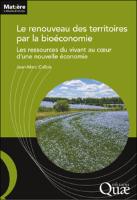Le renouveau des territoires par la bioéconomie
Les ressources du vivant au cœur d’une nouvelle économie
Abstract
Jean-Marc Callois proposes to understand the mechanisms of territorial development, to identify the local potential of bioresources and the articulation between uses, to activate the various public policy tools, to articulate the scales of governance and finally to conceive the economic system as an ecosystem. Living resources are a major element in the response to the environmental crisis. Admittedly, photosynthesis has a much lower energy yield than photovoltaics, but it has the advantage of not requiring increasingly rare minerals whose extraction is polluting. Bioresources have considerable potential for creating activities and jobs, well beyond current food and energy uses. They are also a means of revitalising many rural areas in decline. The book sets out a methodological framework for implementing a territorial development strategy based on bioresources. It brings together the various theoretical tools needed to understand the economic mechanisms underlying territorial development and details their practical application. It is also a plea for greater consideration of the bioeconomy in public policies and in economic thinking. This book is primarily intended for regional development practitioners (local authorities, development agencies, consultants, etc.) who wish to implement such an approach to development.
Keywords
human activity; agriculture; decision support; food; land use planning; sustainable development; economic development; rural development; economy; environmental technology; employment; industry; France; geography; economic impact; public policy; valorisationDOI
10.35690/978-2-7592-3492-9ISBN
9782759234912, 9782759234929, 9782759234936, 9782759234912Publisher
éditions QuaePublication date and place
2022Classification
Agricultural and rural economics


 Download
Download